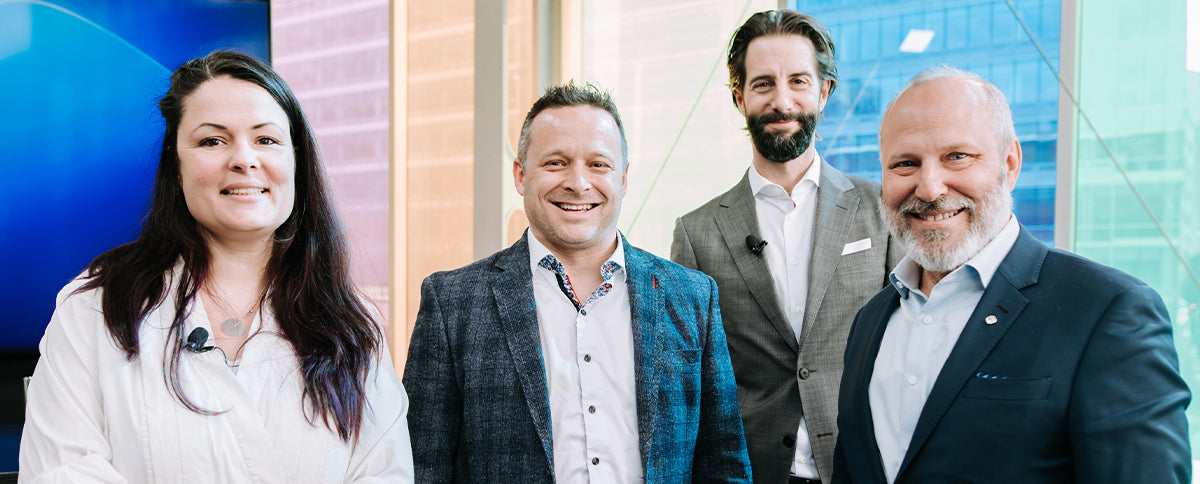The Workplace in Transformation

March 06, 2023
During the first Rendez-vous ED x La Presse webinar entitled “The Future of Work: The End of the Office?,” our guest speakers debated a question that is very much on people’s minds these days: After becoming the norm during the pandemic, will a new era of remote work emerge and sound the death knell of the office as we know it? Read on to found out what they had to say.
Moderated by François Cardinal, Vice-President, Information, and Deputy Editor at La Presse, this roundtable discussion brought together Marine Agogué, Associate Professor, Department of Management, HEC Montréal; Dominic Danis, President of Moov AI; and Michel Leblanc, President and CEO of the Chamber of Commerce of Metropolitan Montreal.
Opening thoughts
Agogué started out by positing that we may indeed be seeing the end of the 9 to 5 grind. “But it isn’t the end of the office per se. That is evolving into something else,” she said.
Danis voiced that the hybrid work model is here to stay, although he thinks that more and more people are interested in returning to the office, at least a few days a week. “Human beings need to be in physical contact with other human beings,” he said.
Leblanc pointed out that there wasn’t a one-size-fits-all approach to work before the pandemic. He maintained that “working together in the same physical location continues to be desirable, from both a human and an economic perspective,” agreeing that face-to-face interaction is a basic human need.
Compelling statistics
Cardinal touched on recent employee surveys about hybrid work arrangements, which put satisfaction ratings for working at the office two or three days a week at over 80%. Respondents tended to credit working from home for letting them stay on task, be more productive, spend less money and waste less time commuting. Leblanc added that, when the topic of remote work is discussed, emphasis is often placed on the benefits it has for individual employees rather than the challenges it can pose for businesses.
On this point, Agogué referred to the findings of a recent study in Germany, which found that, under current labour market conditions, working from home is the first thing people tend to look for and demand of their employers.
Work as a collective undertaking
Remote work may indeed be more attractive to individual employees, but it does have its downsides, specifically as it pertains to teamwork, corporate culture, knowledge transfer, creativity, employee onboarding and peer training.
“This is all a bit of an experiment,” said Agogué. “There are lots of new things being tested out in our organizations right now.” Although the HEC Montréal management professor acknowledged that the full consequences of the shift to remote work will have to play out over the medium and long term, she mentioned that initial studies are point to things like asynchronous work and more people working in silos. “We don’t know yet what this kind of approach will mean over the longer term.”
Leblanc asserted that on-site work is more conducive to growing a business. “With the spectre of recession looming over us, and given the major labour shortages and rising costs we are contending with, we really need to look at organizational productivity from a big-picture perspective. Team dynamics are an important consideration,” he said, adding that non-verbal communication can play a vital role in joint creation, collaboration and decision-making.
From his point of view as the President and CEO of the Chamber of Commerce of Metropolitan Montreal, he highlighted the importance of a bustling central business district in fostering overall productivity, but also in helping to maintain an efficient public transportation infrastructure, keep restaurants open and ensure hospitality workers are adequately compensated, and support a diverse array of shops, services and other amenities. “How else can we keep our downtown cores vibrant, safe and attractive for locals and visitors alike?” he asked.
Asking the right questions
Beyond the realm of the merits and drawbacks of remote work, Agogué indicated that the very meaning and purpose of work itself was being called into question. “It’s not just about checking off a series of tasks,” she said. “Work is a vector of socialization. Through work, I meet people I wouldn’t have necessarily chosen to interact with, and I’m forced to deal with them.” In contrast, working remotely can become an echo chamber, not unlike social media, where people never venture outside of their comfort zone, for fear of being challenged.
Along these same lines, Leblanc stated that work is a powerful driver of corporate culture. “But people don’t want to be stuck working 9 to 5. They don’t want to commute during peak hours. Working from home reflects this need for more flexible schedules.”
Danis countered that it was the time and cost of commuting, both financial and environmental, that were making workers think twice about returning to the office. He explained that most of the people in his company had a hybrid arrangement. “I don’t think everyone wants to stay home. People are happy to be back at the office.” He nevertheless disagreed with the idea of making people come into work for a set number of days per week. “Imposing strict rules on workers isn’t how you’re going to win them back,” he said.
According to Agogué, the key lies in finding what the root appeal of remote work is. “What is it that they like about working from home? What are the benefits? If it’s a matter of having more flexibility and independence, then making them come into the office on specific days during the week isn’t going to meet those needs.”
Incentivizing the return to the office
A few solutions emerged during this eye-opening discussion. Danis said he knew of a “coffee machine” channel used by organizations on their online team platform, where employees could take a few minutes to connect over a hot beverage. The idea is to reproduce the kind of impromptu chats that would happen in the real world. He also indicated that a full third of his office space was dedicated to communal facilities: a kitchen, a lounge and meeting rooms with whiteboards.
These inviting collaborative spaces make people want to come into the office. Leblanc added that his organization reimburses employees for monthly public transit passes if they commit to working at the office four or more times a week.
Agogué nevertheless cautioned against financial incentives. “Taking them away at a later date could actually be perceived as a disincentive. They can be a crutch — a way of avoiding purposeful conversations about the reason we work.” She said that the value of these solutions would be proven or disproven over time. “The workplace is in the midst of a major transformation,” she repeated.
One thing is for sure: as François Cardinal summarized at the end of the discussion, we’re far from striking a balance between the respective needs of workers and employers. The future of the office lies in the ingenuity of business owners to come up with creative solutions that appeal to all concerned.
The recorded webinar is available to watch now
Learn more about our upcoming events
Explore all courses



